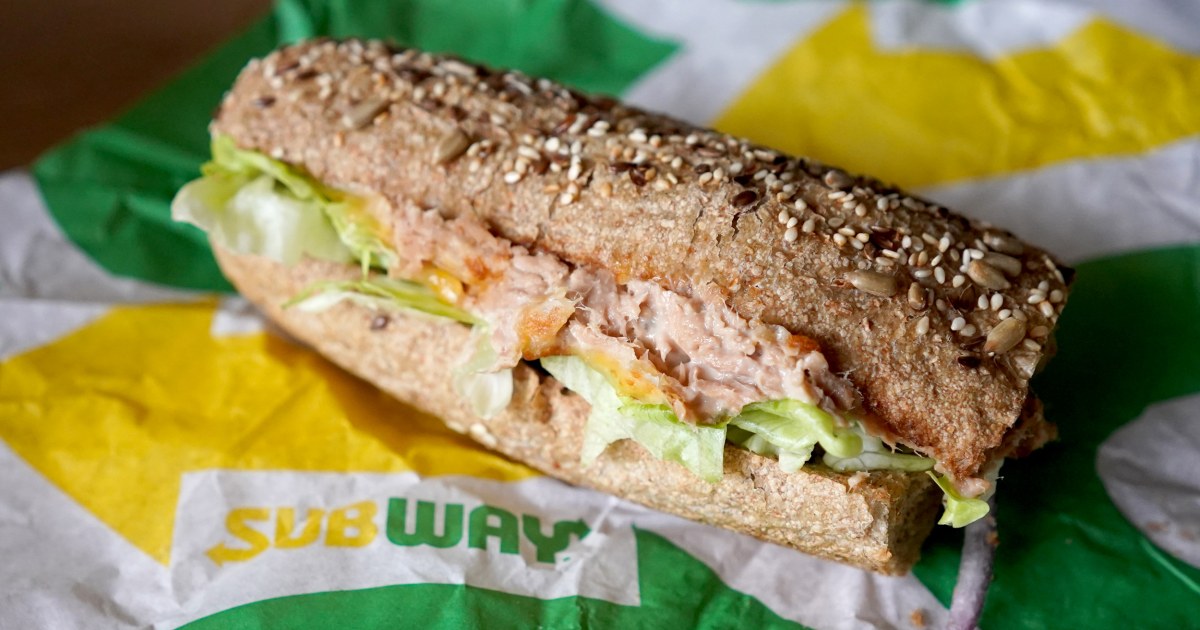A class action lawsuit filed last week in California accuses Subway, the Connecticut-based fast food giant, of fraud and misleading advertising about the content of its tuna sandwiches, which the lawsuit claims to be an “entirely non-tuna mix. that the Defendants mixed resemble tuna and imitate its texture. “
Subway denied the allegations, telling NBC News in a statement that “it delivers 100% cooked tuna in its restaurants, which is mixed with mayonnaise and used in freshly made sandwiches, wraps”.
“These baseless allegations threaten to harm our franchisees, small business owners who work tirelessly to maintain the high standards that Subway sets for all of its products, including tuna,” said Maggie Truax, Subway’s director of global PR, in a statement. by email to NBC News. “Given the facts, the lawsuit constitutes a reckless and inappropriate attack on Subway’s brand and goodwill, and the livelihood of its California franchisees. In fact, there is no legal or de facto basis for the claims of the claimants, who are frivolous and are being pursued without proper investigation. “
Over dozens of pages in the process, plaintiffs Karen Dhanowa and Nilima Amin say they are trying to represent a class of Subway customers who have bought tuna sandwiches that they claim “have no trace of tuna as a component, let alone the main or predominant ingredient. “
The January 21 lawsuit, filed in the Northern District of California at the United States District Court, states that “independent tests repeatedly affirm” the plaintiffs’ allegations, but it does not mention where those tests were conducted, when or by whom. There was no specific evidence to support these claims pointed out in the lawsuit.
Dhanowa did not respond to NBC News requests for comment by phone or text message. Amin did not respond to an email comment request from NBC News.
Their allegations of fraud, says the Dhanowa and Amin lawsuit, stem in part from the fact that the tuna sandwich is more expensive than the other sandwiches on the menu.
“If Claimants and other members of the class had known that the Products really lacked tuna as an ingredient, they would not have purchased the Products or would have paid much less money for them,” the suit said.
Noting that the claimants consumed the sandwiches until 2020, the lawsuit also says that the claimants did not test the tuna on the sandwiches that they actually ate.
“When each was buying and consuming the Products, Claimants did not take steps to verify the components of the Products, or whether the Products contained tuna as an ingredient.”
In an e-mailed statement, Alex Brown, a lawyer for the Lanier Law Firm, who opened the case, echoed the claim of the process that “independent tests of various samples sold in different locations showed the absence of tuna or even protein. fish”.
“We are confident that our customers will win when they get to court,” said Brown.
When asked to cite additional details about the tests, Johnny Cargill, a spokesman for the law firm Lanier, declined to comment.
In turn, the Milford, Connecticut-based sandwich giant, said the process was “part of a trend” to “target the food industry in an effort to make a name for itself in that space”.
“Subway will vigorously defend itself against these and any other unfounded efforts to mischaracterize and tarnish the high quality products that Subway and its franchisees provide to their customers, in California and around the world, and intends to fight these claims for all available means if they are not fired immediately, “said Truax.

